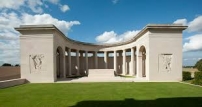| First Name: | George Paul | Last Name: | BANBROOK | |
|---|---|---|---|---|
| Date of Death: | 20/11/1917 | Lived/Born In: | Islington | |
| Rank: | Rifleman | Unit: | King's Royal Rifle Corps11 | |
| Memorial Site: | 1. Islington, St James 2. Cambrai Memorial, Louverval, France | |||
Current Information:Born-Northamptonshire Enlisted-Whitehall
The Battle of Cambrai This was a major British offensive on the Western Front that was launched on 20th November, 1917 and lasted through to the beginning of December. As the name suggests it was an attack towards the city of Cambrai and the important German railhead there, which it was hoped would be captured. The battle was notable for two things: the massed use of tanks for the first time and the success of the first day’s fighting when the formidable Hindenburg Line was breached and gains of five miles were made in places. In celebration the church bells throughout Britain were rung. However this success was short lived. The tanks were not reliable and the German defence stiffened as the fighting progressed and when they counter attacked in force on 30th November, the British came under so much pressure that they were forced to withdraw from many of the positions they had captured earlier on. Both sides suffered around 45,000 casualties during the course of the fighting. On 20th November, the opening day of the battle, 60 and 61 Brigades of 20th Division attacked along the north-west slopes of the Gonnelieu Spur and Welsh Ridge and into the valley beyond. They were followed by 59 Brigade whose task was to pass through after the second objective had been taken and continue the attack. The 11th King’s Royal Rifle Corps were the reserve battalion of 59 Brigade and at 6.20am, zero hour, they left Pigeon Camp and moved forward to take up a position in the newly captured Hindenburg Line. At 6pm they advanced slightly further but the battalion was not engaged in the main fighting of that day and their casualties, which included George Banbrook, were most likely caused by shell fire. |
||||
| « Back to Search Results | ||||
| If you think any of the information shown here is incorrect, Click Here to submit your amends and comments | ||||




